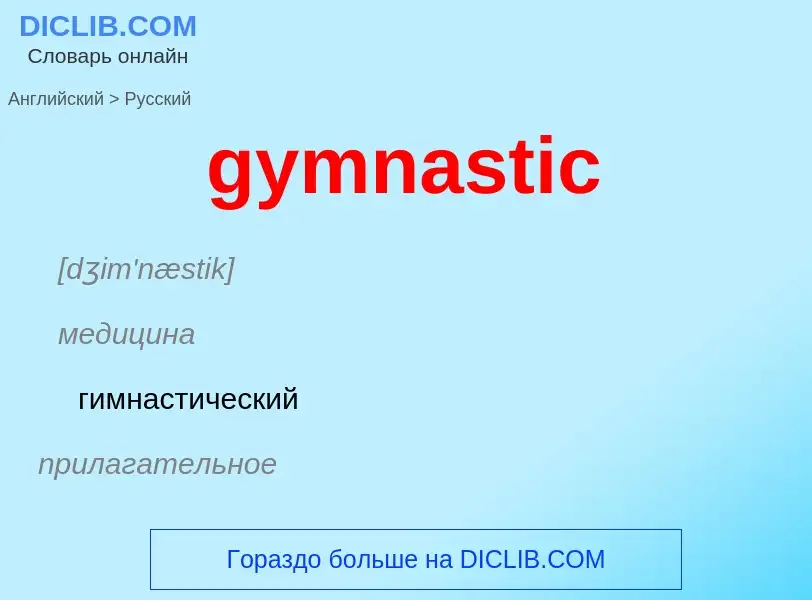Перевод и анализ слов искусственным интеллектом ChatGPT
На этой странице Вы можете получить подробный анализ слова или словосочетания, произведенный с помощью лучшей на сегодняшний день технологии искусственного интеллекта:
- как употребляется слово
- частота употребления
- используется оно чаще в устной или письменной речи
- варианты перевода слова
- примеры употребления (несколько фраз с переводом)
- этимология
gymnastic - перевод на русский
[dʒim'næstik]
медицина
гимнастический
прилагательное
общая лексика
гимнастический
относящийся к умственным
логическим упражнениям
существительное
[dʒim'næstik]
общая лексика
упражнение
умственная тренировка
редкое выражение
gymnastics
['dʒim|næst-{'dʒim}nəst]
существительное
общая лексика
гимнаст
Википедия
.jpg?width=120)
Gymnastics is a type of sport that includes physical exercises requiring balance, strength, flexibility, agility, coordination, and endurance. The movements involved in gymnastics contribute to the development of the arms, legs, shoulders, back, chest, and abdominal muscle groups. Gymnastics evolved from exercises used by the ancient Greeks that included skills for mounting and dismounting a horse, and from circus performance skills.
The most common form of competitive gymnastics is artistic gymnastics (AG), which consists of, for women (WAG), the events floor, vault, uneven bars, and beam; and for men (MAG), the events floor, vault, rings, pommel horse, parallel bars, and horizontal bar.
The governing body for competition in gymnastics throughout the world is the Fédération Internationale de Gymnastique (FIG). Eight sports are governed by the FIG, including gymnastics for all, men's and women's artistic gymnastics, rhythmic gymnastics, trampolining (including double mini-trampoline), tumbling, acrobatic, aerobic, and parkour. Disciplines not currently recognized by FIG include wheel gymnastics, aesthetic group gymnastics, TeamGym, and Mallakhamba.
Participants in gymnastics-related sports include young children, recreational-level athletes, and competitive athletes at all levels of skill.

.jpg?width=200)
![Chris Cameron]] on the pommel horse Chris Cameron]] on the pommel horse](https://commons.wikimedia.org/wiki/Special:FilePath/Christopher Cameron, 2010.jpg?width=200)

![[[Dorina Böczögő]] performing a one-arm press hold during her balance beam mount, 2013 [[Dorina Böczögő]] performing a one-arm press hold during her balance beam mount, 2013](https://commons.wikimedia.org/wiki/Special:FilePath/Dorina Böczögő, balance beam, 2013.jpg?width=200)

![Tsukahara vault]] Tsukahara vault]]](https://commons.wikimedia.org/wiki/Special:FilePath/PIked Tsukahara L9 Reginals.jpg?width=200)

![rhythmic gymnast]] [[Irina Tchachina]] stretching in her warm-up before practice rhythmic gymnast]] [[Irina Tchachina]] stretching in her warm-up before practice](https://commons.wikimedia.org/wiki/Special:FilePath/Överspagat.jpg?width=200)
